The very concept of fate seemed redundant, for a fighter. Train until your muscles ache, bleed for your money and suffer at the paying pleasure of thousands – yet the results were pre-determined? Surely not.
Wandering the streets of Hackney, temptation was spat on every edgy, suburban street corner. Of course, occasionally, a glimpse of promise emerges from the troubled Borough. Sport is often an escape route for those battling the lure of fast money with names such as Lawrence Okolie, Ohara Davies and Anthony Yarde carving out their own success.
Aged only four-years-old, armed with his precious PlayStation controller, one young, battling East London native found himself hastily removed from the area: uprooted and relocated. Lyon Woodstock (11-1, 5KOs) was too young to understand his parents tangled relationship or the intricacies of domestic violence. He loved his mum and his games console, which both made the journey with him to Leicester. We spoke, openly and exclusively for Boxing Social, ahead of his next bout on March 23rd.
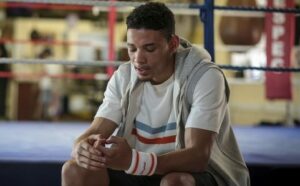
“My earliest memory is from when I was about two-years-old. I’ve got quite a good memory from years and years ago. I dunno why, I just do. I do remember it there [in London], I remember the people I had around me, very vividly as well. I moved with my Mum. She was in an abusive relationship with my father and it was just kinda like an escape. She just tried to get everything together and get out as quick as she could. She got emergency housing in Leicester.
“When we first moved down, I was only a kid, so I didn’t think too much of it. I just thought, ‘Oh this is normal, this is what’s happening!’ But I thought that how everything was with my mum and my dad, I thought that was all normal. I didn’t have the space of mind to understand what was right or what was wrong. When we moved there, I just thought, ‘New house’ I remember my grandparents helping my mum a lot, but yeah, it was pretty normal for me. It wasn’t traumatising for me, it just felt like a normal move.”

Settling in the Midlands was far from comfortable for the new kid in town. Woodstock opened up on his teenage years, searching for his purpose whilst balancing a plethora of studies and fighting his own battle with adolescence. Floating between groups of friends and chasing popularity, there was a certain vulnerability in his tone. One thing the former WBO European champion had never lacked, was the ability to speak his mind, with his mum telling him from a young age that he could be a commentator, because he ‘never shut up!’.
Speaking with Lyon about a range of subjects, he was astute, intelligent and quite, quite different. Our content was barely boxing, yet everything was linked to the sport. Lacing up the gloves had helped him understand his own identity, allowing him the freedom to express himself. It was both the beginning and the end of a tumultuous journey.
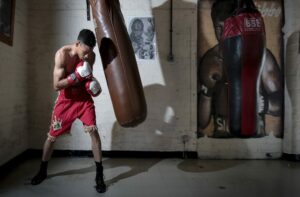
“I was always a bit of a wanderer, mentally. I found it quite hard to focus on one particular thing. So, while I was at school, I wasn’t a bad kid. I had a big imagination and I had a lot of character and energy, but I was also quite quiet sometimes. A bit of a contradiction. I was quite charismatic, but quite reclusive. I had quite a lot of identity issues as a kid, if that makes sense? I just wanted to fit in. I just wanted to be one of the cool kids and to be noticed…
“As soon as I left school, I fell right into the boxing gym and I feel like that’s when I started to truly understand who Lyon Woodstock is. I got to about eighteen or nineteen before I was comfortable with Lyon. I started getting comfortable with who I am, what I’m about and the way I look. That’s when it all started to come together.
Lyon explained, “I’ve always been a person that can talk. I ain’t afraid to express my emotions or feelings and thoughts in any way. There’s no fake bravado or character with anything I say. You get what you see with me. I’m the same with everything; friendships, relationships… A lot of people today try and hold on to their emotions because they’re too worried about what other people will think. But, if that is what you think, then that’s the true you.”
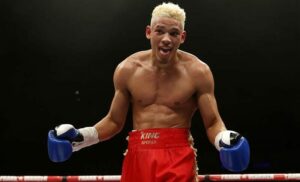
Although he hadn’t entered the gym until aged sixteen, he was one of many teens throwing wild shots in the safety of his bedroom, taking advantage of some equipment that his mum had acquired for her aerobics class. The former area champion detailed how he’d hauled the water-based punch bag up to his room, cleared a massive space on the floor and copied the characters he’d previously controlled on the ‘Fight Night’ computer games. It was an education, of sorts.
He laughed as he told me, “I had these old battered gloves that my mum got with her keep fit thing and I remember punching the shit out of it, for hours. I came downstairs, pure sweating, my mum was like, ‘What the fuck have you been doing?!’ I was like, ‘Aw, you know, I’ve just been boxing!’ (laughs). I drew a face on there and stuck it on, that’s a fact. You know what they bags are like, they move wherever you hit them, left, right. I’m dodging it, thinking I’m flippin’ Prince Naseem, flying around my bedroom! It’s lucky the whole ceiling didn’t fall through!
“When I was a kid, my Grandad used to box for his boarding school. He’s always been keen on boxing and he would always show me fights, talk to me about his record and what he’d done. So, I took a liking towards it straight away. I remember listening to him and thinking, ‘I wanna do that! I wanna get in the ring, I wanna fight someone!’ He showed me loads of old fights, especially Ray Robinson, that was his favourite fighter of all time. I watched so many of his fights, I grew up with them on repeat! It just kinda got embedded in my head from there.”
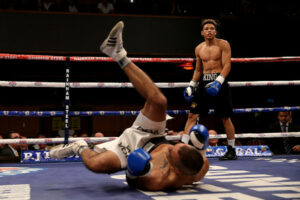
Despite almost finding his feet in isolation and without any official training, Woodstock was athletic and enthusiastic. He never scaled the dizzying heights as an amateur fighter, compiling a decent record but never representing the GB squad or battling for international medals. After turning professional, he revealed it had always been his ambition to sign for legendary, British promoter, Frank Warren – something he’d achieved relatively young.
Alongside super-featherweight peers Zelfa Barrett and Sam Bowen, the Leicester man had been given plenty of airtime by Queensberry promotions. Dressing in his loud, fashionable outfits and unafraid of his own ego, he’d been met with detractors and fans in equal measure. He was part of their revolution of young fighters, marching towards domestic honours and world rankings. Woodstock’s first major test was facing the battle-hardened Craig Poxton, to capture his WBO European strap. An electrifying contest, the pair went life-and-death in a fight of the year candidate. Lyon emerged victorious and with his bleached blonde hair tinted pink with Poxton’s blood.
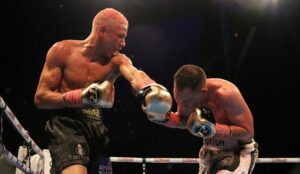
Back then, he was an undefeated jewel in the crown of BT Sports’ assault on pugilism. Five months after his last fight, he now found himself in a totally different position. “Honestly, the next time I see Archie [Sharp], I’ll give him a nice handshake”, Woodstock confessed. “That’s one of the biggest things that I’ve learnt from in my life. I took so much from it. You can’t buy that or experience it anywhere else apart from there. For that, I have to shake his hand. What I’ve got back from that [first defeat], you can’t put a price on it.”
“I wanna have that rematch with Archie. Everything I did last time in the fight, there was nothing wrong with it. It’s just what was going on in my life at the time that was wrong. Does that make sense? If I did everything exactly the same, because of the position I’m in right now, it would make the outcome completely different. Boxing, it’s all mental. I feel like everything in life is 90% mental. You can create things from just thinking about them. If you don’t have the right people around you or you’re not being true to yourself, there’s a spiritual block going on. No matter what you do, things just won’t go your way. There always has to be a balance of negative and positive energy.
“When I was going through my camps last time, I had a lot of negative energy around me, too much of it. I was consciously blind to it. I knew what was going on and how I was being. [I knew] what I was allowing to be around me. I knew it wasn’t good, but my own ego wouldn’t let it go. That’s why I say I need to shake this man’s hand. He’s allowed me to kill my ego – I don’t care about anything, other than what I need to attain. There’s just positivity around me now, my mindset is right and that’s the only thing that would change with the rematch!”
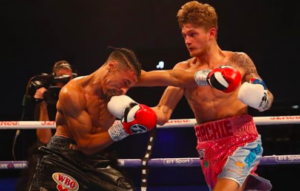
It wasn’t only the rematch with Sharp that the Leicester-man had mentally prepared for. The twenty-five-year-old, dubbed ‘The King’, also fancied himself a British champion by the end of the year, with a keen interest in Sam Bowen’s fight for the Lonsdale title as he battles late replacement, Scotland’s Jordan McCorry. Ambitious? Perhaps. But Lyon had already overcome his quota of standard, domestic ‘away’ fighters. He wanted to test himself against the biggest names – often a rarity in a sport so fragile.
Fighting in just under two weeks, he was itching to return to action. The card in Leicester was to be headlined by the British super-featherweight title fight, with Lyon a keen observer at ringside after he’d handled his own business. Fighting in the city he’d come to recognise as home, he explained his approach to training for his thirteenth fight. Whilst many fighters struggle with making weight and certain aspects of camp as their careers continue, Woodstock was experiencing the opposite.
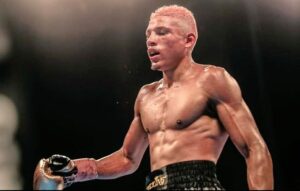
“It’s been very, very chilled out, to be honest. The more times you gotta make weight, go through camp, go for your runs in the morning, the more you do it I feel like the easier it gets. It becomes second nature. It becomes part of your life, part of you and who you are. This camp, the training has been good and very enjoyable. It’s been great, physically, emotionally and mentally. I’m happy, man.
“I said a couple of years ago that I’d probably move up to lightweight, cos I walk around at light-welter or welter. I could definitely move up if I want, but as I said the more I’ve been doing things, the easier it gets. I can make super-feather comfortable, so if I want to move up it would purely be to get titles at a different weight. It will be because I’m done with the weight, because I know how I am. It would only happen when I’ve beat everyone that I perceive to be a star in the division.”
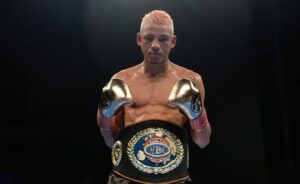
With our discussion swerving away from boxing, I was keen to understand what was important to a man with such considered and strong opinions. Without the pressure of fighting or the uncertainty that accompanies providing for a family, he was far deeper than most athletes. He’d come from a troubled beginning and although not directly involved in the disruption, he’d been tasked with rebuilding his family in the shadows, with caring responsibilities not regularly bestowed upon children. Growing up without a father-figure, he explained his purpose went further than sport.
“It’s as simple as inspiration. As a kid, I never really had no-one to look up to. Not locally or even like within the country, no-one caught my eye. I never thought, ‘Wow, this guy’s amazing! He’s come from this and look what he’s done!’ So, I just wanna be the guy that I needed when I was a kid. I wanna be there for anyone that needs it and show them that it is possible. It doesn’t matter if you’re from a beat-up estate. It doesn’t matter if you’re black, white, Chinese, pink, orange or purple. It don’t matter. Whether you got one mum, one dad, no dad, four dads… It don’t matter. All you gotta believe in is your own thoughts, if you have the desire and the passion. Keep pushing forward!”
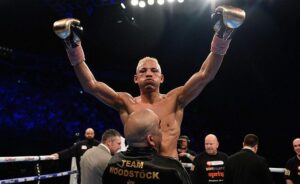
He continued, “One thing that’s killing a lot of people’s dreams is their lack of consistency. Their dreams get shattered by people around them or things that happen around them, but they don’t understand that’s meant to happen to test you. You gotta keep the consistency. I want to inspire people and send a big message to the younger generation or any older people, that we can do this. We can do it. We don’t have to be at home, dossing around. We can do something big with our lives, just believe in yourself. When your mind is young, it’s easy to become susceptible to things. You are very easily led, especially with social media around today. These kids ain’t even got a chance.”
A lot has been made of Lyon Woodstock’s personality. He never carried himself with an ego throughout our conversation, discussing meditation and explaining to me the benefits of spending time alone with your thoughts. We spoke about a potential move into counselling or motivational speaking, something you could easily envision after ten minutes in his company. He had struggled to appreciate boxing, he told me. He couldn’t take it all in, “Right now, because I’m in the midst of it, it’s hard to fully comprehend the whole situation and how it’s came about, does that make sense? I’d find it hard right now to fully comprehend everything. I’ve gotta stay focused, have my goal and achieve that. Then once I’m done I can sit and be like, ‘That was quality!'”

It occurred to me that Woodstock didn’t need boxing. I got the impression he could swagger confidently towards another purpose, staying true to himself. However, without the magic of the sport, where would Lyon be? Maybe locked in his room, living life through a console. Or launching haymakers at the crayon-face drawn on his cheap, leaking punchbag. His last contest was a defeat, yet he had taken more from that fight than all of his previous victories. If you asked him six months ago, he would have encouraged you to believe in creating your own destiny. But now, Lyon believes in fate. What had boxing taught him?
“It taught me how to be a man. Simply put. It teaches you so much about yourself as a person and about other people, as well. I dunno if I say the word right, archetypes? I feel like you see a lot of that, you see people in a different way. You understand emotions, thought patterns and feelings. Boxing is… I dunno, it exposes everything. You can’t hide in boxing. I feel like behind closed doors, most boxers would be caring people. If it doesn’t do that to you, the whole boxing saga, doing everything on your own, then I don’t think you’re connected emotionally.”
Article by: Craig Scott
Follow Craig on Twitter at: @craigscott209